| << | January 1921 | >> | ||||
|---|---|---|---|---|---|---|
| Su | Mo | Tu | We | Th | Fr | Sa |
| 1 | ||||||
| 2 | 3 | 4 | 5 | 6 | 7 | 8 |
| 9 | 10 | 11 | 12 | 13 | 14 | 15 |
| 16 | 17 | 18 | 19 | 20 | 21 | 22 |
| 23 | 24 | 25 | 26 | 27 | 28 | 29 |
| 30 | 31 | |||||

January 25, 1921: "Robots" introduced in fiction by Karel Čapek
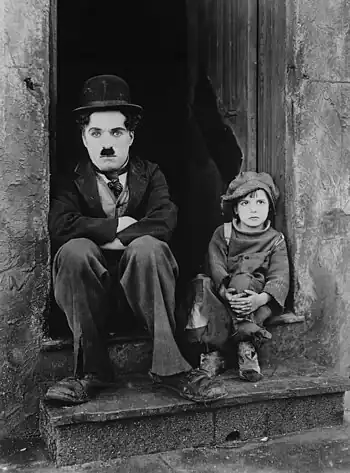
January 21, 1921: American hit film The Kid, with Charlie Chaplin and Jackie Coogan, premieres
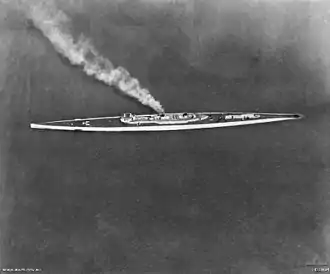
January 20, 1921: All 56 crew of British sub HMS K5 killed in sinking
The following events occurred in January 1921:
January 1, 1921 (Saturday)
- E. W. Scripps and William Emerson Ritter founded Science Service, later renamed Society for Science & the Public in the United States, with the goal of keeping the public informed of scientific developments.[1]
- The Allied forces announced that the Turkish government at Constantinople would be permitted to use 400,000 Turkish Pounds worth of gold from the Imperial Ottoman Bank for funds for the new government's treasury.[2]

The new Ambassador Hotel
- The 24-acre Ambassador Hotel opened in Los Angeles at 12:01 a.m. to usher in the new year.[3][4] The hotel, remembered now as the site of Robert F. Kennedy's assassination in 1968, would close to guests in 1989 and be torn down in 2005.
- In US college football's only major postseason game, the 1921 Rose Bowl, an east-west match-up of two of the major undefeated teams, the California (8-0-0) defeated Ohio State (7-0-0), 28 to 0.[5] In later years, the NCAA would retroactively named California the national college football champion for 1920. In the other postseason football game of the 1920 season, the Fort Worth Classic, Centre College defeated Texas Christian University, 63 to 7.[6]
- Born:
- César Baldaccini, French modern sculptor of the Nouveau Réalisme movement; in Marseilles[7](d. 1998)
- Died:
- Theobald von Bethmann Hollweg, 64, Chancellor of Germany from 1909 to 1917, during the reign of Kaiser Wilhelm II[8]
- Mary Macarthur, 40, Scottish suffragist and national secretary of the Women's Trade Union League, of cancer[9]
January 2, 1921 (Sunday)
- The Spanish liner Santa Isabel (Iquique) sank after running aground during a storm the night before, and striking rocks off the coast of Villa Garcia, killing 244 of the people on board.[10] Most of the passengers and crew were below deck because of the rough weather.[11]
- The British government issued an order to residents of Ireland requiring all households to post a list on their doors of the people residing in the dwelling, on penalty of criminal proceedings.[12]
- Gabriele D'Annunzio ended his attempt to take over Fiume and abandoned the Italian Regency of Carnaro proclaimed by him in 1919.[12]
- Cruzeiro Esporte Clube, one of Brazil's most successful soccer football teams, was founded in Belo Horizonte.
- Pittsburgh's KDKA (AM) radio station made the first live broadcast of a church service, and the first remote broadcast (using a telephone line to transmit the signal to the broadcasting transmitter), as it aired the Sunday services from Calvary Episcopal Church. The National Religious Broadcasters association would celebrate the anniversary half a century later by making "the first international religious broadcast to be transmitted live by satellite" on January 27, 1971.[13]
- Word arrived that the U.S. Navy balloon A-5598, which had been missing since the day after its departure from Rockaway, New York on December 13, had been located after its crash landing 20 miles (32 km) north of Moose Factory, Ontario. The three aeronauts, U.S. Navy Lieutenants Louis A. Kloor, Jr. (mission commander); Stephen A. Farrell (pilot) and Walter Hinton (ground observer), had been missing and were found alive. The trio of aeronauts recovered at Moose Factory, and arrived at the nearest town on a railway line, Mattice on January 11.[14][12] The group, stranded in the wilderness, narrowly avoiding coming down in the James Bay, had wandered for four days before they located a Cree Indian fur trader who initially mistook them for Canadian revenue agents, and then guided the Americans to safety.[15] The group returned to a heroes' welcome in New York City on January 14.[16]
- Died:
- William Robinson, 80, Irish-born American electrical engineer who invented the automatic track circuit signal that made railroad travel safer starting in the 1870s[17]
- Doud Dwight "Ikky" Eisenhower, 3, son of U.S. Army Major Dwight Eisenhower and Mamie Eisenhower, of scarlet fever. In his memoir after his service as President of the United States, Eisenhower would describe his child's death as "the greatest disappointment and disaster of my life, the one I have never been able to forget completely."[18]
January 3, 1921 (Monday)
- At 12:30 in the afternoon Milwaukee's radio station 9XM delivered the first weather forecast to be read on commercial radio, followed by the message in Morse code.[19] Radio weather forecasts had previously been heard in the UK and US.
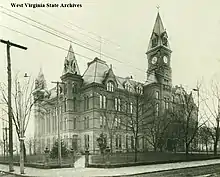
The Capitol before the fire
- A fire destroyed the West Virginia State Capitol Building in Charleston. The blaze started about 5:00 in the afternoon in a small room containing paper records of the state Public Service Commission and quickly spread, leaving only the outer shell of the building. An electrician and a fireman were killed in the collapse of a section of the roof.[20] As a result, a 1921 session of the West Virginia Legislature created a seven-member "Capitol Building Commission", which would ultimately complete construction of the present Capitol building in 1932.
- Germany filed its reply to France's disarmament ultimatum over the terms of the Treaty of Versailles. The letter from German Chancellor Constantin Fehrenbach recited that Germany had done its best to adhere to the terms of the agreement, turning over 50,000 cannons, 60,000 machine guns, 5,000,000 rifles and 20,000 grenade launchers, but the fulfillment of the terms of the treaty to the letter had proven impossible.[12]
- Amelia Earhart had her first flying lesson, given at Kinner Field, in what is now South Gate, California. Her teacher was Neta Snook, a pioneer female aviator who used a surplus Curtiss JN-4 "Canuck" for training.[21]
- Born: Jean-Louis Koszul, French mathematician and algebraic topology theorist for whom the Koszul complex is named; in Strasbourg (d. 2018)[22]
January 4, 1921 (Tuesday)
- The U.S. House of Representatives voted 250 to 66 to override the veto made by U.S. President Wilson of the resolution to reviving the War Finance Corporation. The day before, the U.S. Senate had voted 53 to 5 to override.[12]
- Britain extended martial law to four additional counties in Ireland— County Clare, County Waterford, County Wexford and County Kilkenny.[12]
- The Mayor of Davenport, Iowa, C. L. Bargwald, elected as a candidate of the Socialist Party of America along with a majority of the city aldermen, announced that he was leaving the Socialist Party and called the leftist aldermen "disciples of Lenin, with whom no one could compromise.[23] Over the previous six months, the mayor said, the Socialist majority had blocked any conservative proposal made by him and "forced a program of radical legislation on the city." Mayor Bargwald, who professed to be a follower of Leon Trotsky rather than Vladimir Lenin, said of the SPA "I'm through with them. The principles of Trotsky have no place in America."
- Born: Pedro Richter Prada, Peruvian General who enforced national security as Peru's Interior Minister from 1971 to 1975, then served as Prime Minister of Peru and Defense Minister from 1979 to 1980; later charged in absentia in Italy for the murder of 25 Italian citizens; in Ayacucho (d. 2017)
January 5, 1921 (Wednesday)
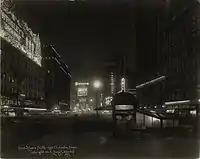
Times Square in 1921
- New York City put into effect "the most radical change in street traffic regulations in the history of New York" at 7:00 in the evening, changing the route through Times Square to northbound only on Broadway and on Seventh Avenue for five hours each night. The new routing affected 40,000 automobiles that traveled through the square during the hours that theaters operated.[24]
- Born:
- Jean, Grand Duke of Luxembourg, monarch and head of state of Luxembourg from 1964 until his abdication in 2000; as son of the reigning Grand Duchess Charlotte in Colmar-Berg (d. 2019)[25]
- Friedrich Dürrenmatt, Swiss author and dramatist; in Konolfingen (d. 1990)
January 6, 1921 (Thursday)
- The First Battle of İnönü began, marking the first clash between the newly organized Army of the Grand National Assembly against Greek troops in the Greco-Turkish War.
- Rufus Isaacs, Lord Reading was appointed as the new Governor-General of India.[12]
- A special committee of the U.S. House of Representatives voted, 10 to 4, to raise the number of U.S. Representatives from 435 to 483 and to set a permanent limit of no more than 500 members of the House.[26]
- Racist protestors in Harlingen, Texas, drove out two Japanese families who had recently purchased farmland for cultivation.[12]
- Born: Marianne Grunberg-Manago, Russian-French biochemist and academic, in Petrograd, Soviet Union (d. 2013)[27]
January 7, 1921 (Friday)

Central Lithuania
- The Republic of Central Lithuania, a puppet state financed by Poland around the rebellion of Lucjan Żeligowski, was established with a capital in Vilnius under Żeligowski's rule. Poland annexed the area a little less than 18 months later, on March 24, 1922. On October 12, 1920, Żeligowski announced the creation of a provisional government. Soon the courts and the police were formed by his decree of January 7, 1921, and the civil rights of Central Lithuania were granted to all people who lived in the area on January 1, 1919.

Speaker Smith
- The British Columbia House of Assembly elected Mary Ellen Smith of Vancouver as Speaker of the Assembly, the first woman legislative leader in North America and in the British Empire.[12]
January 8, 1921 (Saturday)
- Walker D. Hines, the American arbitrator who had been selected by the Allies to make rulings concerning the disbursement of German munitions, assigned 13½ percent of Germany's Rhine river fleet of barges and tugs to France.[12]
- U.S. Navy Lieutenant Warren H. Langdon was shot by a Japanese sentry in Vladivostok, part of the area of Russia occupied by American and Japanese troops during the Bolshevik Revolution.[12]
- Died: Béatrice La Palme, 42, Canadian singer and musician[28]
January 9, 1921 (Sunday)
- Elections were held for the 96 seats of the Senate of France, and the Radicals and Radical Socialists received a plurality with 43 seats, followed by the Republicans with 39. Former President Paul Deschanel was elected as a Senator.[12]
- The United Kingdom returned the colors of the Royal American Regiment, which had existed from 1756 to 1783 as the only British Army regiment to be recruited from American colonial subjects, with the regimental insignia to be hung at the chapel at Governors Island in New York.[29]
- Born: Ágnes Keleti, Hungarian gymnast and five-time Olympic gold medalist; she won four gold medals in the 1956 Summer Olympics; in Budapest (living in 2020)[30]
- Died: Rafael Antonio Gutiérrez, 75, President of El Salvador (1894-1898)[31]
January 10, 1921 (Monday)
- Petroleum production in Arkansas began when the Busey Well No. 1 was completed. The region's oil production, especially in El Dorado and Smackover expanded into a large part of the Arkansas economy.[32]
- Dr. Miguel Gastão da Cunha, Brazil's Ambassador to France, was designated as the new President of the eight-member Council of the League of Nations.[12] Similar to the United Nations Security Council 25 years later, the League Council served as an executive body for the LON and was composed of four permanent member nations (the United Kingdom, France, Italy and Japan) and four non-permanent members selected by the League Assembly every three years. The first of the non-permanent members were Belgium, Brazil, Greece and Spain.
- The certification of the Electoral College votes was made in the Senate, and outgoing U.S. Vice President Thomas R. Marshall formally announced the election of Warren G. Harding and Calvin Coolidge to the presidency and vice-presidency.[12]
- A small fire at the U.S. Department of Commerce destroyed records from previous United States decennial census surveys, but did not affect the 1920 records.[33]
- Corporations across New England announced drastic wage cuts for their employees, ranging from 20% to 25%, and including a 22½% decrease for textile workers.[12]
- Born:
- James Pitts, American chemist and pioneer in research on air pollution; in Salt Lake City, Utah (d. 2014)[34]
- Mazola Holman McKerson, American politician and the first African-American woman to serve as the mayor of a U.S. city of at least 30,000 people (as mayor of Ardmore, Oklahoma from 1979 to 1983); in Bluff, Oklahoma (d. 2014)[35]
January 11, 1921 (Tuesday)
- Riots in towns near Allahabad in British India, over land occupation rights and seniority, reached the point where troops were called in from Lucknow.[12]
- The Battle of İnönü ended after five days with a retreat by the Greek forces from the Turkish Army defenders. The Turks suffered 95 deaths and the Greeks 51 deaths.
- The United States formally withdrew from further participation in the Allied Council, as U.S. Ambassador to France Hugh Wallace announced the severance of U.S. participation in all European councils.[12]
- Born:
- Kathleen Byron, English actress, in West Ham, as Kathleen Elizabeth Fell (died 2009)[36]
- Juanita M. Kreps, the first economist and the first woman to serve as the United States Secretary of Commerce (from 1977 to 1979); as Clara Juanita Morris in Lynch, Kentucky (d. 2010)[37]
January 12, 1921 (Wednesday)
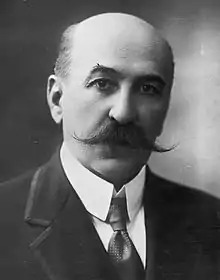
Premier Leygues
- France's Premier Georges Leygues and his government lost a vote of no confidence held in the National Assembly, by a margin of 463 to 125 expressing their dissatisfaction with his failure to enforce reparations from Germany.[38]
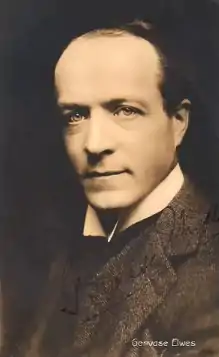
Elwes
- Died: Gervase Elwes, 54, English musical tenor, was killed after being struck by a train in Boston while on a concert tour of the United States. Elwes and his wife had just arrived from New York City and was fatally injured when he "attempted to return to the conductor an overcoat which had fallen from the train, leaned forward too far and was hit by a car.[39]
January 13, 1921 (Thursday)
- The first of the new Indian Councils, giving limited advisory by natives of India in the administration of British India, was inaugurated at Madras by Prince Arthur, Duke of Connaught, former Governor-General of Canada and the uncle of King George V .[40]
- Died: Baron Ijuin Gorō, 68, commander-in-chief of the Imperial Japanese Navy during World War One.[41]
January 14, 1921 (Friday)
- In a bout for the world lightweight boxing championship, held before 12,000 spectators at Madison Square Garden in New York, defending champion Benny Leonard retained his title even after almost being counted out in the first round.[42] Felled by challenger Ritchie Mitchell in the first round. Leonard came within one second of being counted out as referee Johnny Houkup reached nine, before getting back up and knocking Mitchell down for the count of nine, getting back up, then twice more before the end of the round. Mitchell was knocked down again by Leonard for the count of nine in the sixth round, and again got back up. After knocking down Mitchell twice more, Leonard was given the win as the referee ended the fight.
- Born: Murray Bookchin, American environmentalist and pioneer in the ecology movement; in New York City (d. 2006)[43]
January 15, 1921 (Saturday)
- Mitsubishi Electric, the future multinational electronics business, was created as a separate corporation spun off from the Mitsubishi Heavy Industries shipyard in Japan.[44][45]

Hoover
- The first live radio broadcast of a public address from a remote location took place as incoming U.S. Secretary of Commerce Herbert Hoover gave a speech about humanitarian aid to Europe. The speech was made at the Duquesne Club in Pittsburgh and relayed by telephone line to radio station KDKA, ten miles away. According to KDKA's owner, the broadcast would be strong enough to be picked up by amateur radio operators up to 1,000 miles (1,600 km) away on wavelength of 330 meters (equivalent to the 910 kHz frequency on AM radio).[46]
January 16, 1921 (Sunday)
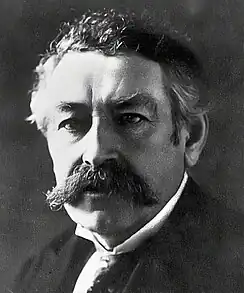
Premier Briand
- Aristide Briand formed a new government of France, presenting the President with a list of cabinet ministers with himself as the Prime Minister as an alternative to reappointing Raymond Poincare.[47]
- With the departure of Gabriele d'Annunzio, General Caviglia of the Italian Army ended the blockade of Fiume.[48]
January 17, 1921 (Monday)

Selbit demonstrating the trick in 1937
- The illusion of "sawing a woman in half" was given its first public performance, as English magician P. T. Selbit demonstrated the trick at the theatre at Finsbury Park in Harringay in London.[49]
- A joint resolution passed Congress urging the U.S. Secretary of War to cease recruiting for the Army until the number of troops could be reduced from 224,000 to a target of 175,000.[50] The measure passed the Senate, 41-32 and the House, 285 to 4.[51]
- In Denver, Internal Revenue officers arrested the leader of a drug ring that operated in 22 of the 48 states and had revenues of over one million dollars.[51]
- Winston Churchill, Britain's War Minister during World War One, accepted the peacetime job of Secretary of State for the Colonies.[51]
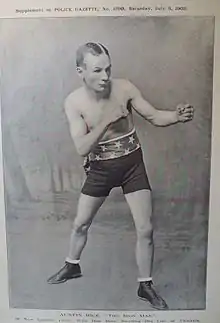
Austin Rice
- Born: Mohammad Asghar Khan, Pakistani military officer and businessman who served as commander-in-chief of the Pakistani Air Force from 1957 to 1964, and then the president of Pakistan International Airlines; in Jammu, Jammu and Kashmir (princely state), British India (d. 2018)[52]
- Died: Austin Rice, 48, American boxer and perennial contender for the world featherweight title, of injuries sustained after he was run over by a horse-drawn wagon[53]
January 18, 1921 (Tuesday)
- A robbery at Chicago's busiest railroad terminal, Union Station, netted $462,000 worth of bonds and cash taken from a mail train.[54] The week before, at Mount Vernon thieves took $197,000 in currency from another train.[55] Gangsters Frank Rio, Robert O'Neill and Thomas Dyer were arrested in October on suspicion of carrying out the robbery[56] which took place shortly after midnight in front of numerous potential witnesses, but were later acquitted.[57] Rio would continue to avoid prison sentences during his lifetime, dying in 1935.
- Iran's Prime Minister Fathollah Khan Akbar withdrew his resignation after pressure from Iranian business leaders.[51] Thirty-four days later, Fathollah was deposed in a coup d'etat along with the Shah, Ahmad Shah Qajar
- Born:
- Yoichiro Nambu, Japanese-born American theoretical physicist and 2008 Nobel Prize in Physics laureate for his 1960 discovery of spontaneous symmetry breaking; in Tokyo (d. 2015)[58]
- Alexander H. Flax, American aeronautical engineer who later served as the Chief Scientist of the U.S. Air Force and then the Director of the National Reconnaissance Office during the Cold War; in Brooklyn (d. 1969)[59]
- Died: Adolf von Hildebrand, 73, German sculptor[60]
January 19, 1921 (Wednesday)
- A treaty to merge the nations of El Salvador, Guatemala, Honduras and Costa Rica into a single republic, the United Provinces of Central America (Provincias Unidas de Centroamérica) was signed in San José, Costa Rica. The attempt to recreate the Federal Republic of Central America, that had existed from 1823 to 1841 before breaking into five nations, did not include Nicaragua and would not go further than the selection of a provisional council of delegates from each state, and none of the signatories ever ratified the treaty.[51]
- The U.S. House of Representatives overwhelmingly rejected the Reapportionment Bill that called for the number of U.S. representatives to be increased from 435 to 483. With the number of representatives remaining at 435, each Congressional district would now represent an average of 242,267 people rather than the 1912 number of one for every 218,979.[51]
- Born: Patricia Highsmith, American novelist of psychological thrillers in the Tom Ripley series; in Fort Worth, Texas, as Mary Patricia Plangman (d. 1995)[61]
January 20, 1921 (Thursday)
- All 56 Royal Navy sailors and officers on the British submarine HMS K5 died when the K-class submarine sank in the English Channel.[62][63]
- The first constitution of modern Turkey was ratified by the Grand National Assembly, with executive power delegated to the Chairman of the Assembly and a Council of Ministers under the direction of the Assembly.[64] The 1921 constitution lasted for three years until superseded by the Constitution of the Republic of Turkey.
- The Dagestan Autonomous Soviet Socialist Republic (Dagestan ASSR) was created by the Soviet Union on the Caspian Sea coast, with a capital at Makhachkala. The ASSR would exist until the fall of the Soviet Union in 1991, and is now administered as a federal subject of Russia.[65]
- The Mountain Autonomous Soviet Socialist Republic (Gorskaya ASSR) was formed by the Soviet Union as territory within the Northern Caucasus Mountains providing limited self government within the Russian SFSR for persons indigenous to region. Over a period of less than four years, the Russian government split the ASSR into various districts.[66]
January 21, 1921 (Friday)

Bordiga
- The full-length silent comedy-drama film The Kid, written, produced, directed by and starring Charlie Chaplin (in his Tramp character), with Jackie Coogan was premiered, making its first public showing at Carnegie Hall in New York before being distributed throughout North America and then the world.[67][68]
- The Italian Communist Party (PCI) was founded in Livorno, splitting from the Socialist Party after the delegates at the Socialist Party convention voted against joining the Moscow Internationale. The vote taken, based on the number of party members represented by each delegate, was 58,900 for joining Moscow, and 112,241 against. Amadeo Bordiga reportedly announced, "We who are in the minority are not going to accept this vote.... Therefore, we announce that the Communists will leave this hall and congregate in St. Mark's Theatre, where a new Communist party will be formed. Hurrah for the Communists!"[69]
- The French Chamber of Deputies approved Aristide Briand as the new premier by a vote of 475 to 68, in response to his more moderate policy regarding German reparations.[70]
- The Irish Republican Army attempted an ambush on Dublin police officers in Drumcondra, a district of Dublin.[71][72] The attack was unsuccessful; one of the IRA members was fatally wounded, and five were captured and sent to Mountjoy Prison. Six of them, led by Patrick Doyle, were executed by hanging on March 14 after being convicted of treason by a military tribunal.[73]
- Born:
- Andreas Ostler, German Olympic bobsledder, in Bavaria (d. 1988)[74]
- Howard Unruh, American mass murderer who killed 13 people in less than 15 minutes in 1949; in Camden, New Jersey (d. 2009)[75]
- Died:
- Arthur Sifton, 62, Canadian politician, second Premier of Alberta, 20th Secretary of State for Canada[76]
- Charles F. Booher, 72, U.S. Representative for Missouri since 1889, died six weeks before the scheduled March 4 expiration of his term[77]
January 22, 1921 (Saturday)
- The Soviet government announced, in Pravda, an immediate one-third reduction in the daily ration of bread for cities, in the middle of winter during an ongoing famine prompted by a drought and poor grain harvest in 1920. "Severe though it was," a historian would note later, "the reduction apparently was unavoidable. Heavy snows and shortages of fuel had held up food trains from Siberia and the northern Caucasus, where surpluses had been gathered to feed the hungry towns of the center and north."[78] The unpopular decision led to protests in cities throughout the Soviet Union, the most prominent of which would be the Kronstadt rebellion in March.
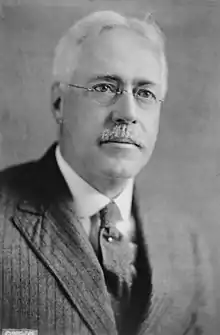
Vanderlip
- The formation of the Council on Foreign Relations was proposed by Frank A. Vanderlip, formerly the Assistant U.S. Secretary of Treasury for President McKinley, and later the President of the National City Bank of New York (now Citibank).[79] Vanderlip spoke in New York City at a meeting of the League for Political Education, and described a body of 30 American business and political leaders who would "direct American intercourse with foreign nations" as well as being a watchdog over the U.S. Department of State. Vanderlip envisioned that the Council would eventually take over the functions of the U.S. Senate in making treaties.
- The Allied Reparations Commission provided a detailed report of German deliveries of reparations made in 1920.[51]

Prince Gustaf
- Sweden's Crown Prince Gustaf who would later reign from 1950 to 1973 as King Gustaf VI Adolf, saved the life of a British sailor in Stockholm's harbor. The man, not otherwise identified, had fallen into deep waters from a vessel that was in port, and Prince Gustaf saw the man in danger of drowning.[80]
January 23, 1921 (Sunday)
- The Akron Pros, defending champions of the NFL's forerunner, the American Professional Football Association, played a postseason game in Los Angeles against the Conn's All-Stars and won, 21 to 7.[81]
- The small town of Killen, Alabama was reportedly destroyed by a fire that burned down Killen's five stores, its three lodge halls and its post office.[82]
- Born:
- Marija Gimbutas, Lithuanian-born American anthropologist who formulated the Kurgan hypothesis that the Indo-European language group and its original speakers had their origin north of the Black Sea; in Vilnius, as Marija Birutė Alseikaitė (d. 1994)[83]
- Leo Major, U.S.-born Canadian Army hero and one of only three soldiers in the British Commonwealth to receive the Distinguished Conduct Medal for heroism in two separate wars (World War II and the Korean War); in New Bedford, Massachusetts (d. 2008)
- Died:
- Heinrich Wilhelm Gottfried von Waldeyer-Hartz, 84, German anatomist and author of the neuron doctrine who coined the terms chromosome and neuron; in the medicine, the Waldeyer's ring is named in his honor to describe the arrangement of tonsils, the adenoid, and lymphatic tissue in the pharynx.
- Mykola Leontovych, 43, Ukrainian musical composer specializing in a cappella choral music, was murdered by an agent of the Cheka, the Soviet Union's secret police.
January 24, 1921 (Monday)
- An assault by land and air from British forces on Somaliland against the "Mad Mullah", Mohammed Abdullah Hassan, captured or killed most of the leaders. The Mullah himself was thought to have escaped, but had actually died a month earlier.[51]
- The U.S. Department of State deported Ludwig C.A.K. Martens, who had purported to represent the Soviet Union as an unrecognized Ambassador.[51]
- A lynch mob in Warrenton, North Carolina broke into the Warren County Jail and forcibly removed and murdered two of the 13 African-Americans arrested in a race riot the day before, which had injured five white and three black people.[84] The two men identified by the mob leaders as the instigators of the riot, Alfred Williams and Plummer Bullock, were taken into a forest one mile outside of town and "riddled with bullets."
- Born: Beatrice Mintz, American embryologist and genetic engineer; in New York City (d. 2022)
January 25, 1921 (Tuesday)
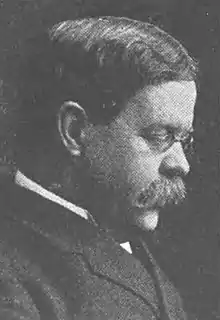
Dr. Sedgwick
- Karel Čapek's popular science-fiction play R.U.R. premiered in Prague in Czechoslovakia[85] and introduced a new word, robot, to the languages of the world. "R.U.R." was "Rossumovi Univerzální Roboti", the name of the company, described in the opening exposition as having been created by Dr. Rossum to build artificial servants. Rendered in English as "Rossum's Universal Robots", R.U.R. was translated by Paul Selver for performance in the United States by New York's Theatre Guild at the Garrick Theatre. The Guild noted that "Rossum's Universal Robots" was "best translated as 'Knowall's Universal Hands'."[86] A literary critic would note later, "Before R.U.R., artificially created anthropoids, like Frankenstein's monster or modern versions of the Jewish legend of the golem, might have acted destructively on a small scale; but Čapek seems to have been the first to see robots as an extension of the Industrial Revolution, and hence to grant them a reach capable of global transformation. Though his robots are closer to what we now might call androids, only a pedant would refuse Čapek honors as the father of the robot apocalypse.[87]
- The U.S. freighter SS Hewitt, at sea since its departure from Port Arthur, Texas on January 20, was last seen about 250 nautical miles (460 km; 290 mi) off of the coast of Florida after making its last regular radio call. All 42 of its crew were lost.[88]
- Born: Josef Holeček, Czechoslovakian canoe rower and winner of gold medals at the 1948 and the 1952 Olympics; in Říčany (now in the Czech Republic) (d. 2005)
- Died: William T. Sedgwick, 65, American epidemiologist and reformer of public health services in the United States
January 26, 1921 (Wednesday)
- Women won the right to vote in Sweden with an amendment to the law passed by its parliament, the Riksdag.[89] Women would first be able to exercise their new right on September 10 in the parliamentary elections.
- The five Allied nations of the Supreme War Council, victors in World War One, gave diplomatic recognition to the Republic of Estonia and to the Republic of Latvia.[90] The U.S. would follow in 1922, along with other nations.
- The collision of two trains killed 17 people near the Welsh village of Abermule.[91] On the Cambrian Railway, the northeast-bound express train from Aberystwyth to Shrewsbury was on the same single line track as the southwest-bound local train from Welshpool to Aberystwyth when the two struck each other at 12:30 in the afternoon.[92][93]
- Convicted murderer Henry Lowery, an African-American, was kidnapped from a train taking him to the Texas State Penitentiary, then tortured and burned to death in a lynching so gruesome that the Governor of Arkansas called it "the most disreputable act ever committed in Arkansas".[94] A mob of 25 men in "six high-powered automobiles", waited for the train to stop at the train station in Sardis, Mississippi, overpowered two sheriff's deputies transporting Lowery, then drove him to Nodena, Arkansas. According to reports, Lowrey was chained to a log and covered with brush, and "It was forty minutes before the last death agony died away and the negro's charred body lay still in death." Lowrey's captors repeatedly turned him over and added oil to the pyre "to hasten the burning".[95]
- In a National Hockey League game in Montreal, the original Ottawa Senators left their match with the Montreal Canadiens with a little more than five minutes to play, as a protest against the officiating of referee Cooper Smeaton.[96] As the Ottawa players departed, Smeaton allowed the game continue for a little longer with only the six Canadiens facing a goal with no goaltender or defenders, and allowed Newsy Lalonde and Amos Arbour to make two additional scores before sounding the gong to end the action.[97] The Senators, who would go on to win the Stanley Cup at season's end, were fined $500.
- Born:
- Eddie Barclay (professional name for Édouard Ruault), French record producer for Blue Star Records and owner of the Eddie's Club nightclub; in Paris (d. 2005)
- Elisabeth Kirkby, English-born Australian TV actress who later earned a Ph.D. at the age of 93; in Bolton, Lancashire (living in 2020)
January 27, 1921 (Thursday)
- District Attorney Whitman of New York City announced indictments of the 13 member "auto squad", 12 men and a woman who had committed insurance fraud by accepting 9,000 stolen automobiles and then turning them in for recovery awards from insurance companies.[51]
- Born: Donna Reed, American film and television actress, winner of an Academy Award for From Here to Eternity; a co-star of It's a Wonderful Life; and later the star of the popular TV comedy The Donna Reed Show from 1958 to 1966; in Denison, Iowa (d. 1986)
- Died:
- Frances McEwen Belford, 82, American activist for better roads who successfully lobbied for the first coast-to-coast interstate highway in the United States, and dubbed the "Mother of the Lincoln Highway".
- Justiniano Borgoño, 84, Peruvian politician who served as Prime Minister of Peru for two months in 1891, and then as the caretaker President of Peru as chairman of a junta for four months in 1894
January 28, 1921 (Friday)
- The Supreme War Council of the European Allied victors in World War One met at Paris and adjusted the total reparations that Germany would have to pay under the Treaty of Versailles, in addition to a 42-year tax of German exports at the rate of 12½% ad valorem, and providing a variable amount of annuities owed, with a range of two billion to six billion Deutschmarks in gold between 1921 and May 1, 1963.[98] Under the plan, Germany would pay two billion per year for the first five years, four billion annually from 1926 to 1930, and six billion per year from 1931 to 1963, a total of 222 billion gold marks (equivalent at the time to $55,500,000,000 in U.S. dollars).[99]
- Dr. Robert W. Wood of Johns Hopkins University gave the first demonstration of his invention of a lamp that used filters to eliminate visible light while projecting ultraviolet UV-A light. More commonly referred to as "black light", the lamp revealed chemicals not readily detectable in ordinary light. As a result, Dr. Wood referred to his creation as the "chemical eye".[100]
- R-34, the first aircraft to cross the Atlantic Ocean, was destroyed by heavy winds after its arrival at the Royal Naval Air Station at Howden in East Yorkshire. The British dirigible was one of the United Kingdom's most expensive aircraft, valued at £250,000[101] equivalent to 12.3 million pounds sterling (or $15.8 million U.S. dollars) today[102]
January 29, 1921 (Saturday)
- The U.S. state of Washington was struck by the Great Olympic Blowdown, the most powerful storm in the state's history up to that time. The high winds swept from the Pacific Ocean across the Olympic Peninsula and caused damage as far east as Walla Walla. Although only two people were killed, the winds of up to 113 miles per hour (182 km/h) knocked down millions of trees, including over 40% of those growing on the southwest side of the Olympic Mountains. Hundreds of farm animals were killed by the flying debris, and the small community of La Push, Washington had 16 homes destroyed.[103]
- The Allied Council relinquished some of its financial claims against the former Austro-Hungarian Empire.[51]
- The New York Yankees baseball team announced that it would construct its own stadium in the Bronx, no longer sharing Manhattan's Polo Grounds with the New York Giants baseball team. The plan was to build Yankee Stadium on the site of the Hebrew Orphan Asylum, bounded by Broadway, Hamilton Place, 138th Street and 136th Street, with construction to begin in June (though the plan was later changed, and the stadium built on the site of a lumberyard purchased from William Waldorf Astor).[104]
- The Supreme Court of France reversed the convictions of six French soldiers who had been wrongfully convicted of desertion and executed in 1914, and awarded a lifetime pension of 2,000 French francs per year to their widows, as well as 1,000 francs to their minor children. Their commanding officer, a French Army lieutenant, later admitted that he had given the men the order to retreat and had denied it during their trial.[105]
- Born: Mustafa Ben Halim, Egyptian-born Prime Minister of Libya serving King Idris from 1954 to 1957; in Alexandria (d. 2021)
- Died: Alfred Tredway White, 74, American philanthropist and housing reformer who built quality low-income apartment buildings to replace tenements in Brooklyn during the late 19th century, drowned after falling through thin ice while skating.[106]
January 30, 1921 (Sunday)
- Twelve guests— six men and six women— died in a fire at the Colonial Hotel in Hoboken, New Jersey, United States; three others were seriously injured. The fire was caused by another guest who left a lit cigar smoldering in his room when he went out.[107][108] The cigar set fire to drapery, and the flames then spread to other rooms.
- Died: John Francis Murphy, 67, American landscape painter
January 31, 1921 (Monday)
- The commercial sailing cargo schooner Carroll A. Deering was found after it had run aground off of the coast of Cape Hatteras, North Carolina in choppy waters, but none of its crew of 10 people were ever seen again.[109] The last communication from the Deering had been on January 28 when it attempted to hail a light ship, and was spotted on January 29 moving toward the Diamond Shoals. The only living thing on board was the ship's mascot, a parrot.[110] When the U.S. Coast Guard was finally able to board the ship on February 4, investigators found that both of the ship's lifeboats had been taken down and evidence that the evacuation had happened quickly. The fate of the Carroll A. Deering has remained a mystery for almost a century.[111]
- With less than five weeks left in his term, U.S. President Woodrow Wilson announced that he would not commute the prison sentence of Socialist Party leader Eugene V. Debs, despite the recommendations of Wilson's anti-Communist Attorney General, A. Mitchell Palmer to release Debs on February 12 for Lincoln's birthday.[112] Debs had slightly less than five years remaining of a 10-year prison sentence for espionage and was incarcerated at the U.S. Penitentiary in Atlanta.
- Born:
- Carol Channing, American stage and film actress and singer, winner of the 1964 Tony Award for Hello, Dolly!; in Seattle (d. 2019)
- Mario Lanza, American opera tenor, singer and film actor; as Alfredo Arnold Cocozza in Philadelphia (d. 1959)
- Abu Sayeed Chowdhury, President of Bangladesh 1972 to 1973; in Kalihati Upazila, Bengal Province, British India (d. 1987)
- Died: Frederic Hale Parkhurst, 56, Governor of Maine, of pneumonia, 26 days after his inauguration.[113] Parkhurst became ill after winning the general election in September. The president pro tempore of the Maine Senate, Percival P. Baxter, served the remaining 3 years and 11 months of Parkhurst's term.
References
- ↑ Tobey, Ronald C. (1971). The American Ideology of National Science, 1919-1930. Pittsburgh: University of Pittsburgh Press. pp. 66–70. ISBN 9780822975946.
- ↑ "Allies to Release Turkish Gold Held— Will Allow Use of 400,000 Turkish Pounds Subject to Surveillance by Commission", The New York Times, January 2, 1921, p16
- ↑ "New Year's Day Program Is Gay — Ambassador Hotel to Open Minute Past Midnight", Los Angeles Times, December 29, 1920, p17
- ↑ "$5,000,000 L.A. Hotel, 'The Ambassador,' Open", Los Angeles Evening Express, January 1, 1921, p3
- ↑ "Ohio State Falls Before California", The New York Times, January 2, 1921, p20
- ↑ "Centre Eleven Victor", The New York Times, January 2, 1921, p20
- ↑ Alex Kayser (1981). Artists' Portraits. H.N. Abrams. p. 1917. ISBN 978-0-8109-2222-8.
- ↑ The Independent. proprietors. 1921. p. 68.
- ↑ John, Angela V. "Mary Reid Macarthur". Oxford Dictionary of National Biography (online ed.). Oxford University Press. doi:10.1093/ref:odnb/30411. (Subscription or UK public library membership required.)
- ↑ "Fear 150 Perished— Only 45 Are Rescued From Wrecked Spanish Steamer", The New York Times, January 4, 1921, p3
- ↑ "Panic Prevailed in Spanish Wreck", The New York Times, January 7, 1921, p4
- 1 2 3 4 5 6 7 8 9 10 11 12 13 14 15 16 17 The American Review of Reviews Volume 63 (February, 1921) pp135-139
- ↑ "Transmission by Satellite Marks 50-Year Gain in Radio Religion", by Donald Janson, The New York Times, January 28, 1921, pA1
- ↑ "Lost Balloon Safe Near Hudson Bay; All the Men Alive", The New York Times, January 3, 1921, p1
- ↑ "Fright of Indian Nearly Cost Lives of Balloonists", The New York Times, January 6, 1921, p1
- ↑ "Returning Airmen Cheered by 10,000", The New York Times, January 15, 1921, p7
- ↑ International Railway Congress Association (1922). Monthly Bulletin.
- ↑ Doug Wead (18 February 2003). All the Presidents' Children. Simon and Schuster. pp. 358–. ISBN 978-0-7434-5139-0.
- ↑ Randall Davidson, 9XM Talking: WHA Radio and the Wisconsin Idea (University of Wisconsin Press, 2007) p38, p347, citing "History of Radio in Relation to the Work of the Weather Bureau", by E. B. Calvert, Monthly Weather Review (January 1923) p1
- ↑ "Fire Ruins Capitol of West Virginia", The New York Times, January 4, 1921, p1
- ↑ Victoria Garrett Jones (2009). Amelia Earhart: A Life in Flight. Sterling Publishing Company, Inc. p. 6. ISBN 978-1-4027-5157-8.
- ↑ "Jean-Louis Koszul". Academie des sciences (in French). Retrieved 20 November 2020.
- ↑ "Mayor Drops Socialism", The New York Times, January 5, 1921, p7
- ↑ "Times Sq. Tries Out New Traffic Rules", The New York Times, January 6, 1921, p1
- ↑ Paxton, J. (23 December 2016). The Statesman's Year-Book 1972-73: The Encyclopaedia for the Businessman-of-the-World. Springer. ISBN 9780230271012 – via Google Books.
- ↑ "Vote to Raise House to 483 Members", The New York Times, January 7, 1921, p8
- ↑ The International Who's Who 1992-93. Taylor & Francis. 1 August 1992. p. 632. ISBN 978-0-946653-84-3.
- ↑ "Beatrice La Palme Died Saturday. Canadian Operatic Artist Made Debut at Covent Garden in 1903". Montreal Gazette. January 10, 1921. Retrieved 2010-07-07.
- ↑ "Royal American Infantry Colors of 1753 To Be Returned by Great Britain Today", The New York Times, January 9, 1921, p1
- ↑ Robert Slater (1994). Great Jewish Women. Jonathan David Publishers. p. 129. ISBN 978-0-8246-0370-0.
- ↑ Pan American Union (1921). Bulletin of the Pan American Union. The Union. pp. 533–.
- ↑ George C. Branner, Outlines of Arkansas' Mineral Resources (Arkansas Bureau of Mines, Manufactures, and Agriculture, 1927) p. 193
- ↑ "Census Papers Lost in Washington Fire", The New York Times, January 11, 1921, p1
- ↑ Wilson, Janet (2014-06-19). "Pollution expert James Pitts dies, 1921-2014". University of California, Irvine. Retrieved 2014-07-18.
- ↑ Barbara A. Seals Nevergold; Peggy Brooks-Bertram (1 January 2007). Uncrowned Queens: African American Women Community Builders of Oklahoma. SUNY Press. p. 60. ISBN 978-0-9722977-4-5.
- ↑ Kathleen Byron obituary, The Daily Telegraph, 21 January 2009.
- ↑ United States Department of Commerce (1988). From Lighthouses to Laserbeams: A History of the U.S. Department of Commerce, 1913-1988. U.S. Department of Commerce, Office of the Secretary. pp. 75–.
- ↑ "French Cabinet Is Overthrown, 463 Votes to 125", The New York Times, January 13, 1921, p1
- ↑ "Gervase Elwes, English Tenor, Is Killed By Train in Boston Back Bay Station", The New York Times, January 13, 1921, p1
- ↑ "New Indian Councils Inaugurated by Duke", The New York Times, January 14, 1921, p4
- ↑ The United States Army and Navy Journal and Gazette of the Regular and Volunteer Forces. Army and Navy Journal Incorporated. 1921. p. 590.
- ↑ "Leonard Winner of 'Society Bout'", The New York Times, January 15, 1921, p14
- ↑ Small, Mike (August 8, 2006). "Murray Bookchin" (Obituary). The Guardian. Retrieved June 30, 2018.
- ↑ Tōyō Keizai Shinpōsha, Japan Company Directory, (University of California, 1973) p6
- ↑ "Mitsubishi Electric", Forbes.com
- ↑ "Radio to Carry Hoover Appeal to Far Points— Talk on European Relief Here to Be Heard Within 1,000-Mile Radius", The Gazette Times (Pittsburgh), January 15, 1921
- ↑ "Briand Forms Cabinet to Work with the Allies", The New York Times, January 17, 1921, p1
- ↑ "Fiume Blockade Ends", The New York Times, January 17, 1921, p1
- ↑ Jim Steinmeyer, Hiding the Elephant: How Magicians Invented the Impossible (Random House, 2003) pp. 277–295
- ↑ "Congress Makes the Army 175,000; Now up to Wilson", The New York Times, January 18, 1921, p1
- 1 2 3 4 5 6 7 8 9 10 11 The American Review of Reviews Volume 63 (March, 1921) pp249-252
- ↑ Khan, Mohammad Asghar (1969). Pakistan at the Cross Roads. Lahore, Pakistan: Ferozsons.
- ↑ "Iron Man Austin Rice Died Saturday Evening", Meriden Morning Record, pg. 2, Meriden, CT., 17 January 1921.
- ↑ "BIG MAIL ROBBERY at Union Station— Bold Work of 4 Men in Motor Car", Chicago Daily Tribune, January 18, 1921, p. 1
- ↑ "Mail Thieves Get $700,000 in Loot", The New York Times, January 20, 1921, p1
- ↑ "$1,000,000 Mail Robbery Solved, Inspectors Say— Claim Three Leaders Are Under Arrest", Chicago Daily Tribune, October 3, 1921, p21
- ↑ "Continuances Aid Criminals to Flout Justice— Delayed Trials Are His Strongest Defense", Chicago Daily Tribune, February 14, 1922, p5
- ↑ Lars Brink; Lay Nam Chang; Moo-young Han; Kok Khoo Phua (20 May 2016). Memorial Volume For Y. Nambu. World Scientific. p. 37. ISBN 978-981-310-834-9.
- ↑ "Alexander H. Flax Obituary". The Washington Post. September 12, 2014. Retrieved May 15, 2015.
- ↑ Alice Von Hildebrand (2000). The Soul of a Lion: Dietrich Von Hildebrand : a Biography. Ignatius Press. p. 198. ISBN 978-0-89870-801-1.
- ↑ Robin W. Winks; Maureen Corrigan (1998). Mystery and Suspense Writers: The Literature of Crime, Detection, and Espionage. Scribner's Sons. p. 503. ISBN 978-0-684-80519-1.
- ↑ "British Submarine Lost With 56 Men", The New York Times, January 23, 1921, p7
- ↑ "K 5 Sunk With All Hands— Six Officers and 51 Men Lost", The Times, January 24, 1921, p10
- ↑ J. Holland Rose, The Development of the European Nations, 1870-1921 (G. P. Putnam's Sons, 1922) p211
- ↑ "Dagestan", in Historical Dictionary of the Chechen Conflict by Ali Askerov (Rowman & Littlefield, 2015) pp85-86
- ↑ Philip G. Roeder, Where Nation-States Come From: Institutional Change in the Age of Nationalism (Princeton University Press, 2012) p62
- ↑ "Chaplin Returns to Screen— His 'The Kid' as Six-Reeler, a Year in Making", Boston Post, January 22, 1921, p6
- ↑ "Chaplin Has Rival in Smart Infant; He's Jackie Coogan", Daily News (New York), January 21, 1921, p15
- ↑ "Italian Communists Split from Socialists", The New York Times, January 22, 1921, p3
- ↑ "Briand Policy to Germany Is Approved" Baltimore Sun, January 22, 1921, p1
- ↑ "Hot Battle Fought Near Dublin— Crown Forces Take Ambushing Sinn Feiners by Surprise", Pittsburg (sic) Press, January 21, 1921, p1
- ↑ Niamh O'Sullivan, Every Dark Hour: A History of Kilmainham Jail (Liberties Press, 2007)
- ↑ "Six Prisoners Were Executed in Dublin Today— Twenty Thousand People Gathered Outside Prison", Ottawa Evening Journal, March 14, 1921, p1
- ↑ "Andreas Ostler". Olympic.org. Retrieved 20 November 2020.
- ↑ Jay Robert Nash (1989). Encyclopedia of World Crime: S-Z ; Supplements. CrimeBooks. p. 3016. ISBN 978-0-923582-04-3.
- ↑ Hall, David (2004). "Arthur L. Sifton". In Bradford J. Rennie (ed.). Alberta Premiers of the Twentieth Century. Regina, Saskatchewan: Canadian Plains Research Center, University of Regina. p. 38. ISBN 0-88977-151-0.
- ↑
- United States Congress. "January 1921 (id: B000626)". Biographical Directory of the United States Congress.
- ↑ Paul Avrich, Kronstadt 1921 (Princeton University Press, 2014) p35
- ↑ "Vanderlip Plansa 'Super-Senate'", The New York Times, January 23, 1921, p12
- ↑ "Gustave of Sweden Saves British Tar", The New York Times, January 24, 1921, p. 1
- ↑ "Akron Professional Team Beats Coast Eleven, 21-7", Chicago Tribune, January 24, 1921, p15
- ↑ "Fire Wipes Out Alabama Town", New York Tribune, January 24, 1921, p5
- ↑ Ware, Susan; Braukman, Stacy Lorraine (2004), Notable American Women: A Biographical Dictionary Completing the Twentieth Century, Cambridge, Massachusetts: Harvard University Press, p. 234, ISBN 978-0-674-01488-6
- ↑ "Lynch Two Negroes After a Race Riot", The New York Times, January 24, 1921, p1
- ↑ Willard Bohn, Apollinaire and the Faceless Man: The Creation and Evolution of a Modern Motif (Fairleigh Dickinson University Press, 1991) p166
- ↑ "'R. U. R.' Opens Guild's Season; 'Chauve-Souris,' Third Edition And Hoffe's New Play This Week", Brooklyn Times Union, October 8, 1922, p15
- ↑ "Machine Morality and Human Responsibility", by Charles T. Rubin, in Science, Virtue, and the Future of Humanity (Lexington Books, 2015) p155
- ↑ David A. Southern and Grenville Clark, The Mystery Ship: Tragedy of the S.S. Hewitt and Other Ill-Fated Vessels (Military Training Publishing, 1921) pp. 323–327.
- ↑ Jad Adams, Women and the Vote: A World History (Oxford University Press, 2014) p191
- ↑ "Berlin to Get Until July 1 For Disarming; Esthonia and Latvia Recognized, Action on Lithuania and Georgia Held Up", New York Tribune, January 27, 1921, p4
- ↑ "Sixteen Killed in Wales Railroad Wreck", Miami Herald, January 27, 1921, p. 1
- ↑ "Welsh Express Wrecked— Head-On Collison— Sixteen Killed—London Coach Telescoped", The Times (London), January 27, 1921, p. 10
- ↑ "Railways Archive: Accident Returns: Extract for Accident at Abermule on 26th January 1921"
- ↑ "Governor Denounces Tragedy", The New York Times, January 27, 1921, p1
- ↑ "Mob Burns Negro After 100-Mile Trip", The New York Times, January 27, 1921, p1
- ↑ "Unsatisfactory Finish to Pro Hockey Fixture", Montreal Gazette, January 27, 1921, p16
- ↑ "Ottawa-Canadien Game at Montreal Ended in Uproar with Habitants Ahead, 5-3", Ottawa Citizen, January 27, 1921, p10
- ↑ "Supreme Council Decision on Disarmament Given to German Delegate in Paris; No Modifications Will Be Permitted Which Might Diminish Proceeds Of German Customs Without Approval Of Reparations Commission— 41 Annuities Running From May 1, 1921 to May 1, 1963", Arizona Republic (Phoenix), January 31, 1921, p1
- ↑ "Fix German Indemnity at $55,500,000,000, in Graded Annual Payments for 42 Years Plus 12½ % Per Cent Tax on German Exports", The New York Times, January 27, 1921, p1
- ↑ "Demonstrates Power of 'Chemical Eye'", The New York Times, January 30, 1921, p5
- ↑ "R-34, Dirigible That Crossed Atlantic, Left Only a Scrap Heap by Heavy Wind", The New York Times, January 30, 1921, p1
- ↑ "Why a pound today is worth only 2% of a pound in 1921"
- ↑ "The Olympic Blowdown of January 29, 1921", by Wolf Read, University of Washington Climatology, December 11, 2002
- ↑ "Yankees Pick Site for New Ball Park— Decide to Purchase Hebrew Orphan Asylum Plot, 136th Street, Near Broadway", The New York Times, January 30, 1921, p1
- ↑ "French Court Clears Soldiers Put to Death", The New York Times, January 30, 1921, p3
- ↑ "A. T. White Drowns in Forest Lake; Pioneer in Charity", The New York Times, January 31, 1921, p1
- ↑ "12 Die, 3 Hurt in Hotel Due to Cigar", Detroit Free Press, January 31, 1921, p1
- ↑ "Hoboken Hotel Holocaust Claims Twelve Victims; Probe to Follow", Daily News (New York), January 31, 1921, p3
- ↑ "Mystery in Wreck of Boston Schooner", Boston Globe, February 1, 1921, p2
- ↑ "Parrot Lives But Can't Tell— Mystery of the Deering Remains Unsolved", Boston Globe, February 3, 1921, p1
- ↑ "The Legend Of The Ghost Ship: Carroll A. Deering", National Parks Foundation
- ↑ "Wilson Refuses to Pardon Debs", The New York Times, February 27, 1921, p1
- ↑ The New England Historical and Genealogical Register. New England Historic Genealogical Society. 1934. p. 173.
This article is issued from Wikipedia. The text is licensed under Creative Commons - Attribution - Sharealike. Additional terms may apply for the media files.